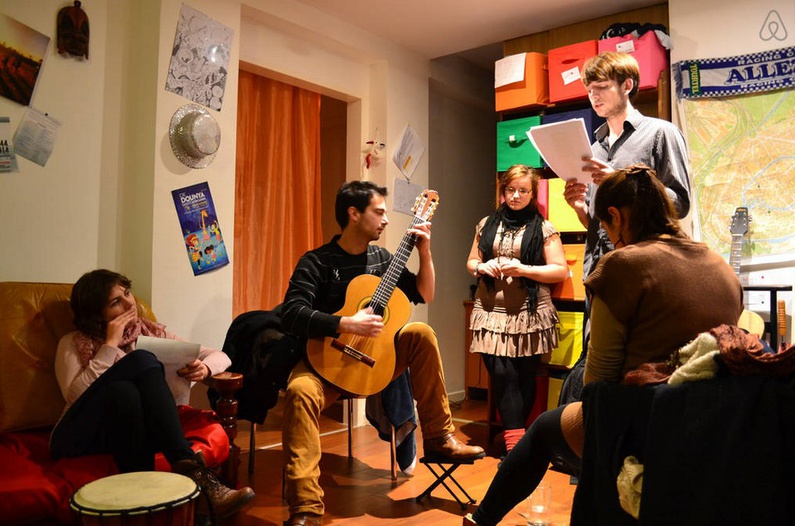![Image for [eng] Straßburg: Wwoofing gegen Wohnungsnot](https://media.cafebabel.com/resized-images/73/9a/127b5b132735fa2aff9fc84bca7f6e6828ae.jpg)
[eng] Straßburg: Wwoofing gegen Wohnungsnot
Published on
Translation by:
Jane EggersLack of housing in France and football schools in Burkina Faso – in one project? Strasbourg hostel Tom’s Fair House wants to lead the way.
The train stops. Near the station, Félicien catches up with me. In short sentences he tells me that there is no time to take my luggage to the flat. We push our way through the crowded streets in the centre of Strasbourg. Accompanying us is Vuk from Serbia, who is studying Chemistry at the university here. Both work for Tom's Fair House, the hostel where I'm going to stay.
Originally, my plan was to come to Strasbourg to visit Félicien, whom I had met at a theatre workshop in Bochum. He had told me that he worked at a hostel because he had not found an affordable apartment. Here, he could live for free. When I found out what this hostel really is, I was fascinated. Instead of spending a weekend there as planned, I stayed for a week.
At the hostel, I briefly introduce myself. In return I get a pointing finger and a "that's your bed". I can stay here for the next few nights. Félicien and I sit. Against the wall opposite are bunk beds. Seven people are seated on various armchairs, sofas and beds, the boss, Thomas Hicker-Fritz, somewhere among them.
Accommodation in Return for Work
Thomas is 35, born here in Strasbourg, and a dreamer who wants to save the world a little bit. He stops at nothing: once he nearly bought Strasbourg Football Club for one Euro. He started Tom's Fair House in August 2013. Wwoofing, short for 'World-Wide Opportunities on Organic Farms', is a concept that you usually come across in rural areas with a high quota of backpackers. Which is why people are quite surprised to find a project in the centre of Strasbourg that offers wwoofing on its website. Thomas' concept is a simple one: guests who do small jobs pay less. For more work they can stay for free. "It attracts a lot of interest," says Thomas. More than he thought.
The founder of Tom's Fair House knows that to be true to the original meaning of wwoofing, he would need to grow organic vegetables. But that is not planned for now. He keeps the basic principle of "accommodation in return for work", and simply reinterprets the form of the work part. It should be free.
Actually Thomas was in the middle of founding a football school for girls in Burkina Faso, but first he had to look for financing options. Bit by bit, he developed a concept. First he rented and managed two apartments belonging to his parents on Quai Finkwiller; later he rented them out via AirBnB. In March 2014 they were joined by the apartment in Rue Gustave Doré. There is hardly a night with a free bed. Most of the guests, who are between 18 and 30, want to learn French; many are studying, some are working, or they live in Strasbourg in order to enjoy the multicultural dialogue. According to Thomas, Strasbourg's wwoofing hostel has hosted over 40 nationalities from all the continents.
More than AirBnB
"At the beginning I thought it'd be three wwoofers; now there are ten." Félicien came to Strasbourg in 2014 to study theatre studies. But for months he could not find any accommodation. Room rates are set up for tourism and were therefore not within his budget. A room in Strasbourg now costs on average 449 euros. Rents are on a level with cities such as Hamburg or Helsinki.
Organisations, too, are unable to cope with the lack of student housing. At Crous, the French student support organisation, they told me that all student accommodation was full. Due to the large number of applicants, it was not even possible to get on the waiting list.
 When he came to Tom's Fair House - initially for a short period - Félicien and some of the other wwoofers organised a reggae concert to raise money for Thomas' project in Burkina Faso. "Advertising, planning and then running an event: those were things I knew about from the theatre project I'd been involved in. Thomas helps me, so that makes it even more fun to be able to give something back," says Félicien.
When he came to Tom's Fair House - initially for a short period - Félicien and some of the other wwoofers organised a reggae concert to raise money for Thomas' project in Burkina Faso. "Advertising, planning and then running an event: those were things I knew about from the theatre project I'd been involved in. Thomas helps me, so that makes it even more fun to be able to give something back," says Félicien.
It was similar for Nuno from Lisbon, who designed the flyers and posters for the concert; Marina, who teaches French once a week in the living room in Rue Gustave Doré; or Rafael from Mexico, who gave up his impersonal tourist guide job to be a host at Tom's Fair House. Given enough freedom, wwoofers find their jobs all by themselves. "Making beds and cleaning apartments is one thing, but when it's about putting a concert together, for example, some wwoofers feel much more motivated."
Meanwhile, Thomas' project is no longer simply an AirBnB profile with good ratings, but a registered non-profit organisation. In his own blog, Thomas writes regularly about his activities in Burkina Faso. Tom's Fair House is an attempt at a solution in a city in which signs of social disparity are completely covered over by a picture of flourishing tourism. It has grown from a niche that developments such as the share economy and social networks have opened and decisively promoted.
Translated from Straßburg: Wwoofing gegen Wohnungsnot



